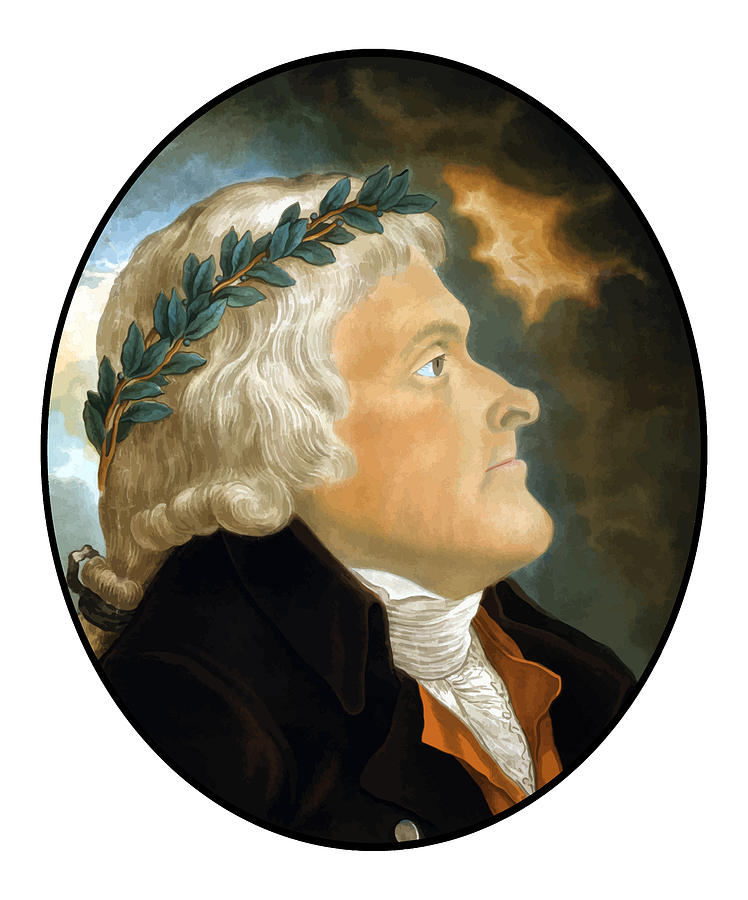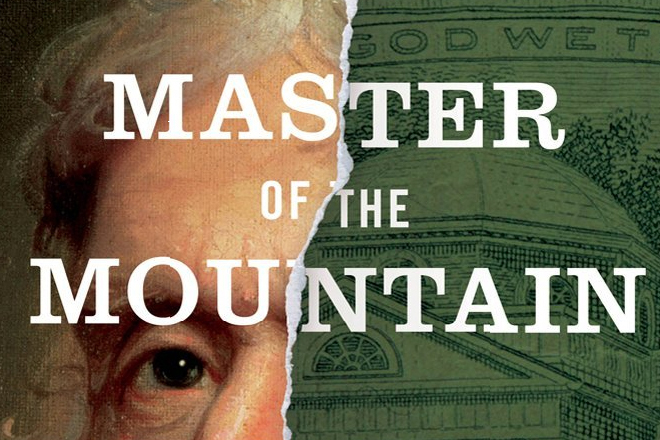
As reviewed in the Wall Street Journal's Bookshelf, "Monticello's Slave-Driver: Whatever moral ambivalence Jefferson may have felt toward slavery he overcame when he sat down to do the numbers for his estate, by Fergus M. Bordewich, on 1 November 2012 -- Posterity justly reveres Thomas Jefferson as a president, political thinker, renaissance man and diplomat, but until recently little attention was paid to his practices as a slave master and man of business. Although he owned one of the largest estates in Virginia, his management of his labor force at Monticello has usually been treated as a sideshow at best. As a slave owner, Jefferson has generally gotten a pass even from liberals, who lionize him as the founder of the forerunner of the Democratic Party, as well as from historians who have been all too eager to describe him as a generous, enlightened and reluctant master. After all, hadn't he written the words that became a clarion call for the abolitionists of later generations: "All men are created equal?"
Jefferson's long honeymoon is now over. In 2008, Annette Gordon-Reed, in "The Hemingses of Monticello," plumbed the depths of Jefferson's complex relationship with his enslaved concubine, Sally Hemings, and her family. Henry Wiencek's indictment of Jefferson in "Master of the Mountain" is even more damning.

The strongest sections of the book track Mr. Wiencek's close reading of Jefferson's estate records, where he found a coldblooded taskmaster who ruthlessly exploited child labor and overworked his slaves as a matter of course. Jefferson sometimes countenanced brutal punishment, including the whipping of boys as young as 10 or 11 in his highly profitable nail factory, "whose profits paid the mansion's grocery bills," Mr. Wiencek writes. Despite Jefferson's occasional assertions that slavery would one day wither away, he never lifted a finger to weaken it as an institution, even when implored to do so by friends and allies who regarded slavery as an affront to the values for which patriots had fought the Revolutionary War.
In his youth, Jefferson did hold antislavery convictions. And in his earliest draft of the Declaration of Independence, he may well have had slaves in mind when he declared that all men were created equal.(Southerners were sufficiently worried that they tried unsuccessfully to have the word "men" changed to "freemen.") By 1784, however, in "Notes on the State of Virginia," he expressed in graceful but cringe-inducing prose a deep personal distaste for blacks, who, he asserted, smelled wrong, copulated with apes in Africa, and were incapable of intellectual achievement.

Master of the Mountain; By Henry Wiencek
Whatever moral ambivalence he may have felt toward the institution of slavery he overcame when he sat down and did the numbers for Monticello. In 1792, he calculated precisely what his slaves were worth. Mr. Wiencek writes: "What Jefferson set out clearly for the first time was that he was making a 4 percent profit every year on the birth of black children. The enslaved children were yielding him a bonanza, a perpetual human dividend at compound interest." To intimates, Jefferson described slavery matter-of-factly as a good investment strategy, advising one friend that if his family had cash to spare, "every farthing of it [should be] laid out in land and negroes."
When it comes to Jefferson the slave owner, Mr. Wiencek's judgment is unsparing. "His assets reliably compounding, his philosophy rendering him deaf to the appeals of humanity, he plowed through any contradiction," he writes. "He wielded a species of power that made its own reality." Mr. Wiencek notes that Jefferson deliberately presented visitors with an idyllic but artificial picture of slave life at his estate. He would point to a few exceptionally industrious slaves who in fact, Mr. Wiencek says, "were desperate to remain in the master's favor, to stay on the mountaintop"—that is, the part of the estate closest to the house—"and not be sent [to the plantations] below, where the overseers were in charge."

As a businessman, Jefferson was in tune with the evolving economy of the slavery-dependent South. By the eve of the Civil War, a generation after his death in 1826, slaves would collectively constitute the second most valuable capital asset in the United States, after land. Jefferson owned more than 600 over the course of his lifetime. At any given time, as many as 140 lived on the estate, some of them blood relatives of his deceased wife Martha, including Sally Hemings, Martha's mixed-blood sister, who apparently bore Jefferson several children.
Mr. Wiencek differs from Ms. Gordon-Reed on the significance of the Jefferson-Hemings relationship and devotes comparatively little space to it. Ms. Gordon-Reed concluded that, despite the inherent inequality of slave and master, a degree of mutual affection must have existed between two people who, she argued, remained intimate for more than 30 years. Mr. Wiencek is convinced that Jefferson felt little emotion for any of the people he owned and believes that the Jefferson-Hemings relationship was a mere "transaction" that lasted just a few years.

It seems sadly all too true that, as Mr. Wiencek puts it, "Jefferson constantly moved the boundaries on his moral map to make the horrific tolerable to him." He spoke about the practical impossibility of emancipation, but he knew several Virginians who had freed their slaves as a matter of principle. As Mr. Wiencek showed in "An Imperfect God" (2003), his fine study of George Washington and his slaves, one of these Virginians was the nation's first president, who liberated, in his will, all the bondsmen he held in his name. In this deeply provocative and crisply written journey into the dark heart of slavery at Monticello, Henry Wiencek brings into focus a side of Jefferson that Americans have largely failed—or not cared—to see. This book will change forever the way that we think about the author of the Declaration of Independence.
Mr. Bordewich's most recent book is "America's Great Debate: Henry Clay, Stephen A. Douglas, and the Compromise That Preserved the Union." (source: The Wall Street Journal; Copyright 2012 Dow Jones & Company, Inc. All Rights Reserved This copy is for your personal, non-commercial use only.)
VFH Fellowship Series - Henry Wiencek from Charlottesville's TV10 on Vimeo.
WOW just what I was searching for. Came here by searching for how
ReplyDeleteto become a seo specialist
my webpage; pozycjonowanie
I am glad for authors like Wiencek showing what our founding fathers were really like. Slavery for too long has been pushed to sidelines. Since studying slavery and having read Wienceks books, I now see that our nation was born as a slave republic with the "All men are created equal" statement as meaning certain white men. Highly recommend reading his books.
ReplyDeleteRon... One of jefferson's problem was he WAS NOT a good businessman. He didn't have a clue when it came to keeping the books. Because there were no accounting standards at the time, many of the founding fathers went broke.
ReplyDeleteThis comment has been removed by the author.
ReplyDeleteAccording to the following document, Jefferson was so racist he was willing to jeopardize the national interests of the USA in order to help Napoleon restore slavery on St-Domingue (present day Haiti). http://www.library.vanderbilt.edu/Quaderno/Quaderno2/Q2.C5.Zuckerman.pdf
ReplyDelete